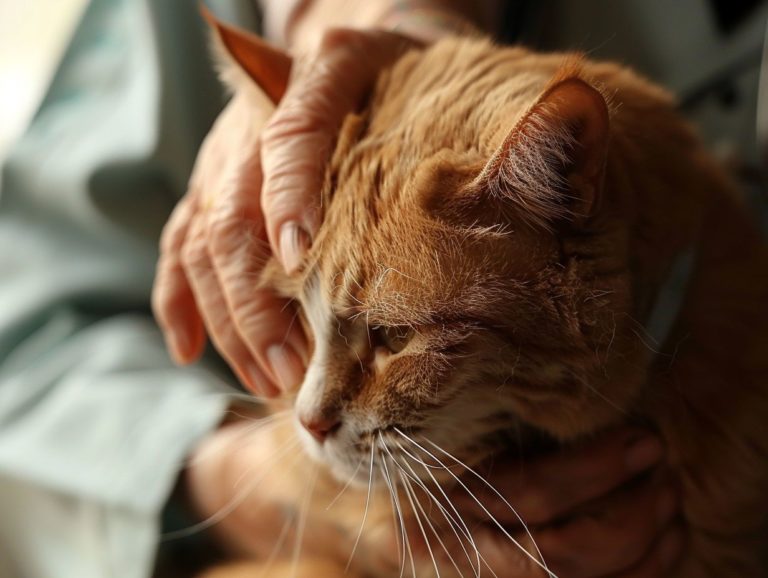How To Choose The Right Senior Cat Insurance Policy
As cats age, their healthcare needs become more significant, especially for senior cats. Providing more attentive care for senior cats underscores the importance of having relevant insurance coverage.
This section will explore factors to consider when purchasing insurance for elderly cats, the various types of policies available, and essential features to look for, all aimed at helping you deliver the most suitable care for your aging feline companion.
Key Takeaways:
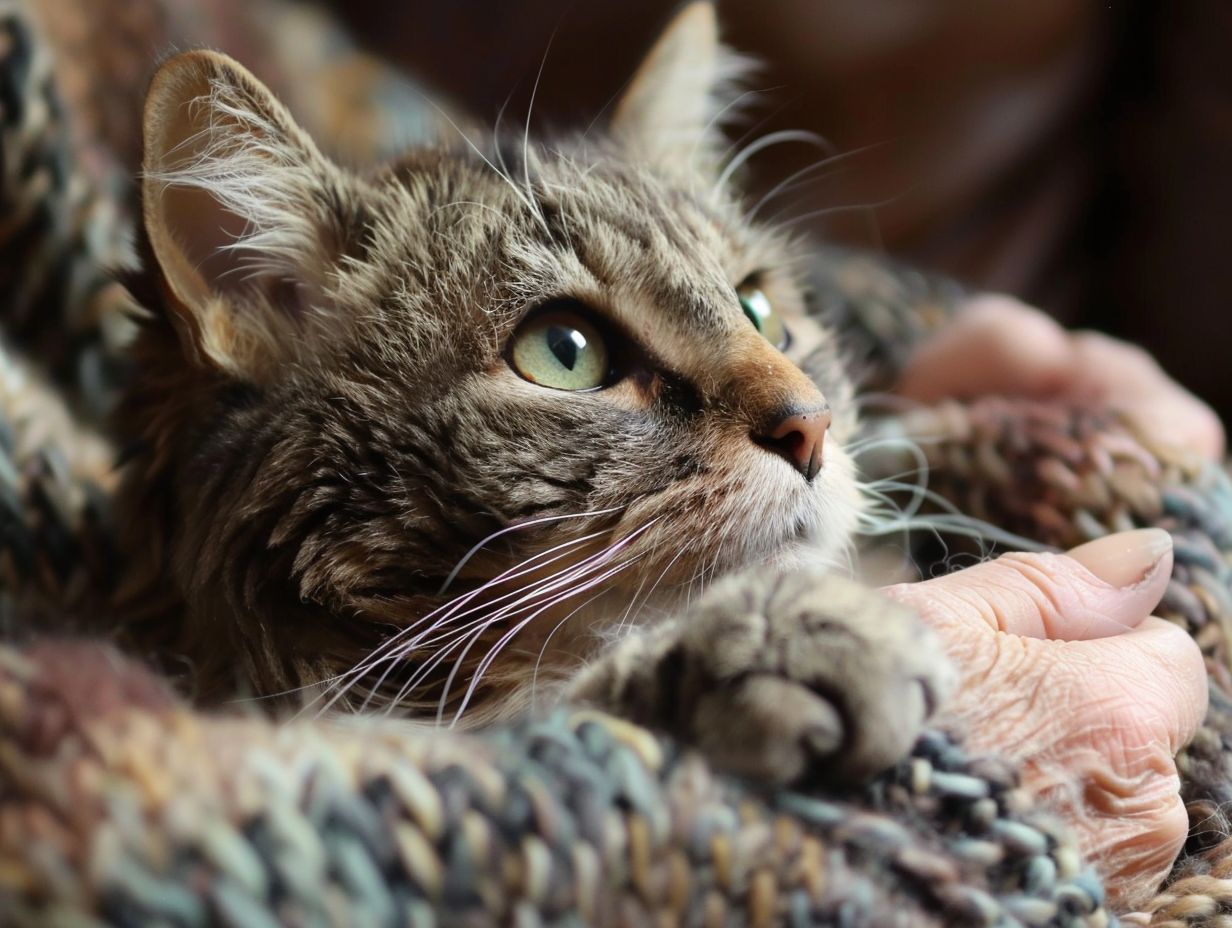
The Importance of Senior Cat Insurance
Senior cat insurance is an insurance policy that offers comprehensive coverage with quality healthcare for elderly cats. As cats age, they become more prone to various health conditions and diseases, making reliable insurance essential to ensure they receive necessary veterinary care.
Pet insurance for older cats includes coverage options such as medical treatments, prescription drug coverage, surgery, and preventive care. Pet insurance companies set variable age limits, so it is crucial to choose a policy that aligns with the specific needs of senior cats. By reimbursing qualifying expenses, insurance companies help manage veterinary costs, alleviating the financial burden on pet owners.
Senior cat insurance not only provides financial protection but also peace of mind to pet owners, assuring them that they can afford the best care for their elderly feline companions.
Why Senior Cats Require Special Care
Senior cats need specialized care due to their tendency to develop age-related conditions and illnesses. These may include dental disease, chronic conditions, and age-related diseases that necessitate regular veterinary attention for diagnosis and treatment.
Routine check-ups are crucial for senior cats as they enable veterinarians to identify and manage common conditions in older cats such as kidney disease, hyperthyroidism, arthritis, and diabetes. Dental health is of particular importance, as untreated periodontal diseases can lead to pain, infection, and systemic illness.
Providing a well-balanced diet, opportunities for exercise, and a stress-free environment can significantly enhance the quality of life for senior cats and reduce the impact of age-related health issues.
Factors to Consider When Choosing a Policy
When selecting cat insurance for older cats, important factors to consider include coverage options, age limits, costs, and deductible amounts. Pet owners should ensure they choose a policy that meets their cat’s specific needs while staying within their budget.
Adequate coverage for specialized care for older cats, covering conditions like arthritis, kidney disease, or dental issues, is crucial when choosing a cat insurance policy. It is essential to assess the long-term cost-effectiveness of the policy, considering both monthly premiums and potential out-of-pocket expenses.
Another key factor to consider is the deductible structure, which is the amount that must be paid out of pocket before insurance coverage kicks in.
Age and Health of Your Cat
When determining the appropriate pet health insurance policy for your cat, factors such as their age and current health status should be considered. Pre-existing conditions, renal disease, kidney failure, diabetes, and cancer history are important factors to take into account in order to provide adequate coverage and effectively manage any health-related risks.
Understanding your cat’s age and existing health conditions is crucial for making informed decisions about pet insurance. For senior cats, it is essential to have coverage for common conditions like renal disease, diabetes, and cancer.
Insurance plans that are tailored for specific medical conditions will provide the necessary support and financial assistance for treatments and medications, ensuring that your cat receives the best possible care without any financial constraints.
Coverage Options and Limits
It is important to understand the different coverage options and limits offered by various pet insurance companies to ensure comprehensive coverage for your senior cat. This includes considering whether the policy covers chronic conditions, heart disease, renal disease, dental issues, and the maximum benefit amount. These factors are crucial for maintaining the health and well-being of your aging pet.
Senior cats often require ongoing medical treatment for chronic conditions like diabetes or arthritis, making comprehensive coverage critical. Heart disease, renal disease, and dental care are common healthcare needs for senior cats, making it advantageous to have these included in your policy.
Assessing the maximum benefit limits helps determine if the coverage is adequate to cover potential healthcare expenses, providing financial security during your pet’s senior years.
Cost and Affordability
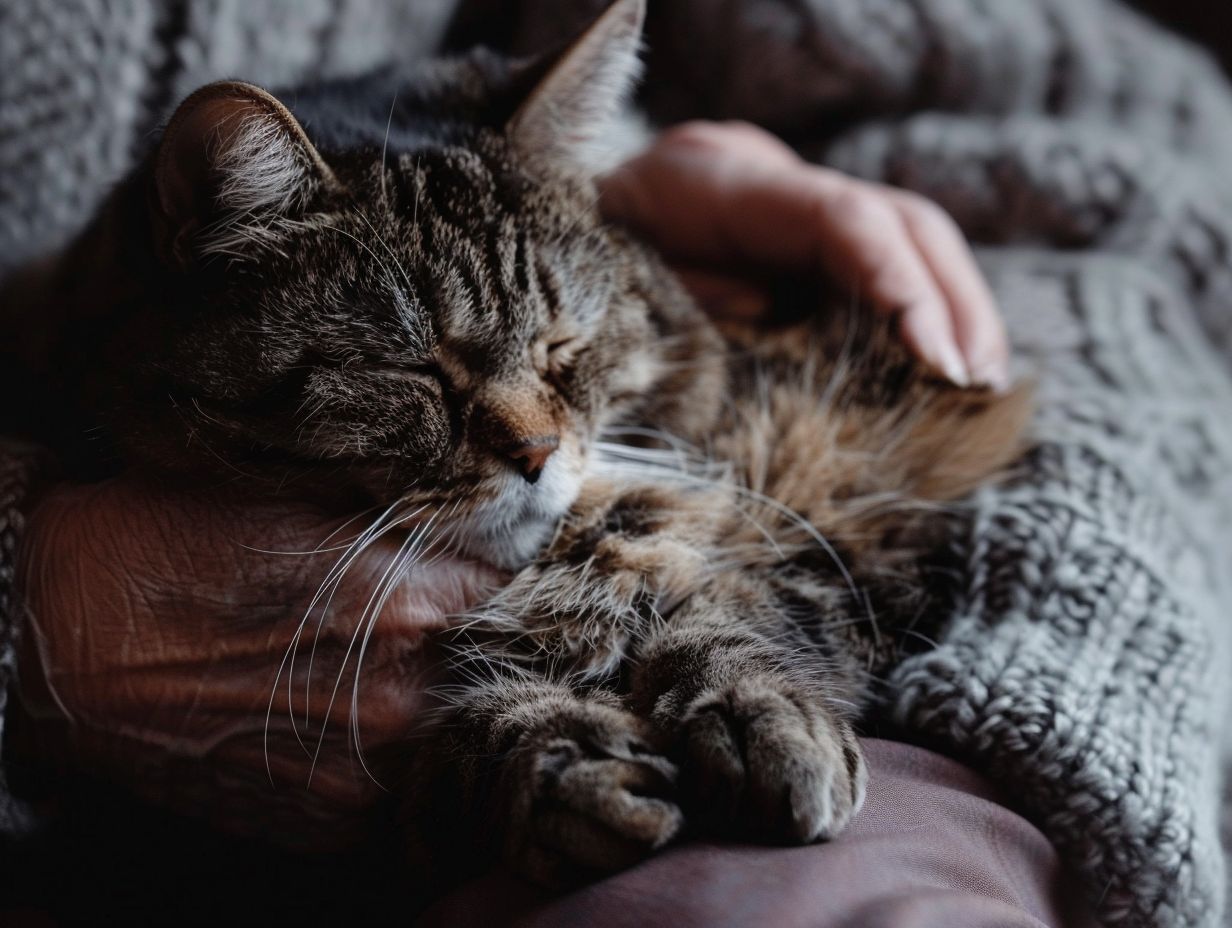
When choosing pet insurance for older cats, cost and affordability are crucial factors to consider. Assessing expenses such as premiums, coverage costs, exclusions, limitations, and co-payment obligations is essential to ensure that the selected policy aligns with your budget and offers appropriate protections for your senior cat.
It is important to strike a balance between understanding the financial aspects of a pet insurance policy, including premium rates, co-payments, and cost-sharing, and comprehending the coverage and limits provided by the policy. While the instinct may be to minimize costs and premiums, it is also important to be mindful of the limitations and exclusions that may be present in lower premium policies. Some policies may involve higher co-payment costs, requiring the pet owner to contribute more out of pocket for the cost of care. Having a good grasp of these financial aspects can help prevent unexpected financial burdens while ensuring that your senior cat receives the necessary care.
Types of Senior Cat Insurance Policies
Senior cat insurance policies can offer accident or illness coverage, often combining both aspects to provide added benefits and increased flexibility tailored to the specific medical requirements of older cats. These policies aim to offer comprehensive protection against unforeseen veterinary expenses, bringing peace of mind to pet owners.
The accident coverage typically includes protection for injuries sustained from accidents or falls, while the illness coverage encompasses chronic conditions, cancer treatments, and prescription medications. Diagnostic tests, surgery, hospitalization, and rehabilitation may also be included in the coverage, along with options for alternative therapies like acupuncture and physical therapy, depending on the policy. These choices enable pet owners to select a policy that aligns best with the individual medical needs of their senior cat, ensuring financial security against unexpected medical costs.
Accident-Only Policies
Accident-only policies are specifically designed to cover veterinary costs for injuries and accidents that are unexpected and are incurred by your senior cat. These policies specifically cover accidents and ensure that your elderly pet gets the necessary medical care promptly. With accident-only policies, senior cats are provided a financial safety net to cover unforeseen costs.
These policies usually cover costs associated with X-rays, surgeries, prescription medicines, and hospitalizations that are linked to an accident. Pet owners benefit from insurance providers who offer these policies by having a financial safety net for unforeseen costs. Insurance companies also ensure that they offer affordable policies that are tailored to the needs and benefits of senior cats.
Reliability in terms of customer service is a benefit of these policies, as insurance companies provide assistance in navigating the claims process and managing the policy.
Accident and Illness Policies
Accident and illness policies provide comprehensive coverage for both unexpected accidents and common health issues such as chronic conditions, cancer, and other illnesses that senior cats may encounter. These policies offer a range of coverage options and require regular premium payments to maintain continuous protection.
Premium payments play a crucial role in sustaining the comprehensive coverage options for aging feline companions as they ensure that the policies remain active and effective. By contributing to these premiums, pet owners can secure financial support for potential veterinary expenses related to chronic conditions, cancer treatments, and other common health issues that often afflict older cats.
This proactive approach not only provides peace of mind but also ensures that senior cats receive the necessary care and treatment without undue financial strain on their owners.
Comprehensive Policies
Comprehensive insurance policies for senior cats effectively address dental, chronic conditions, and other medical needs. They typically provide detailed policy documents and comparison tools to assist pet owners in selecting the most suitable policy. These policies ensure that pets receive coverage tailored to their specific concerns and help pet owners understand the offered coverage, enabling them to choose a policy that meets the needs of their senior cat.
Dental and chronic condition coverage, in particular, offers pet owners peace of mind in caring for their aging feline companion. The availability of detailed policies and comparisons enables consumers to make informed decisions regarding the best policy and coverage for their senior cat’s unique requirements. Comprehensive insurance policies encompass a wide range of medical needs, ensuring that senior cats receive timely and appropriate care.
Key Features to Look for in a Policy
When selecting a pet insurance policy for senior cats, key features to consider include age limits, coverage for dental disease, pre-existing condition coverage, and policy flexibility. These features are essential in ensuring that the policy meets the unique needs and risks of senior cats.
Age-related coverage considerations are crucial for senior cats as their health needs change with age. Policies that cover conditions commonly seen in older cats, such as arthritis and kidney disease, provide tailored coverage for insurance solutions for senior cats require.
Dental coverage provisions are important in cat insurance for older cats, as dental issues become more prevalent as cats age. Pre-existing condition coverage guarantees that ongoing health issues are included in the benefits of insurance coverage. Policy flexibility allows for adjustments and customization to meet your cat’s changing healthcare needs over time.
Preventive Care Coverage
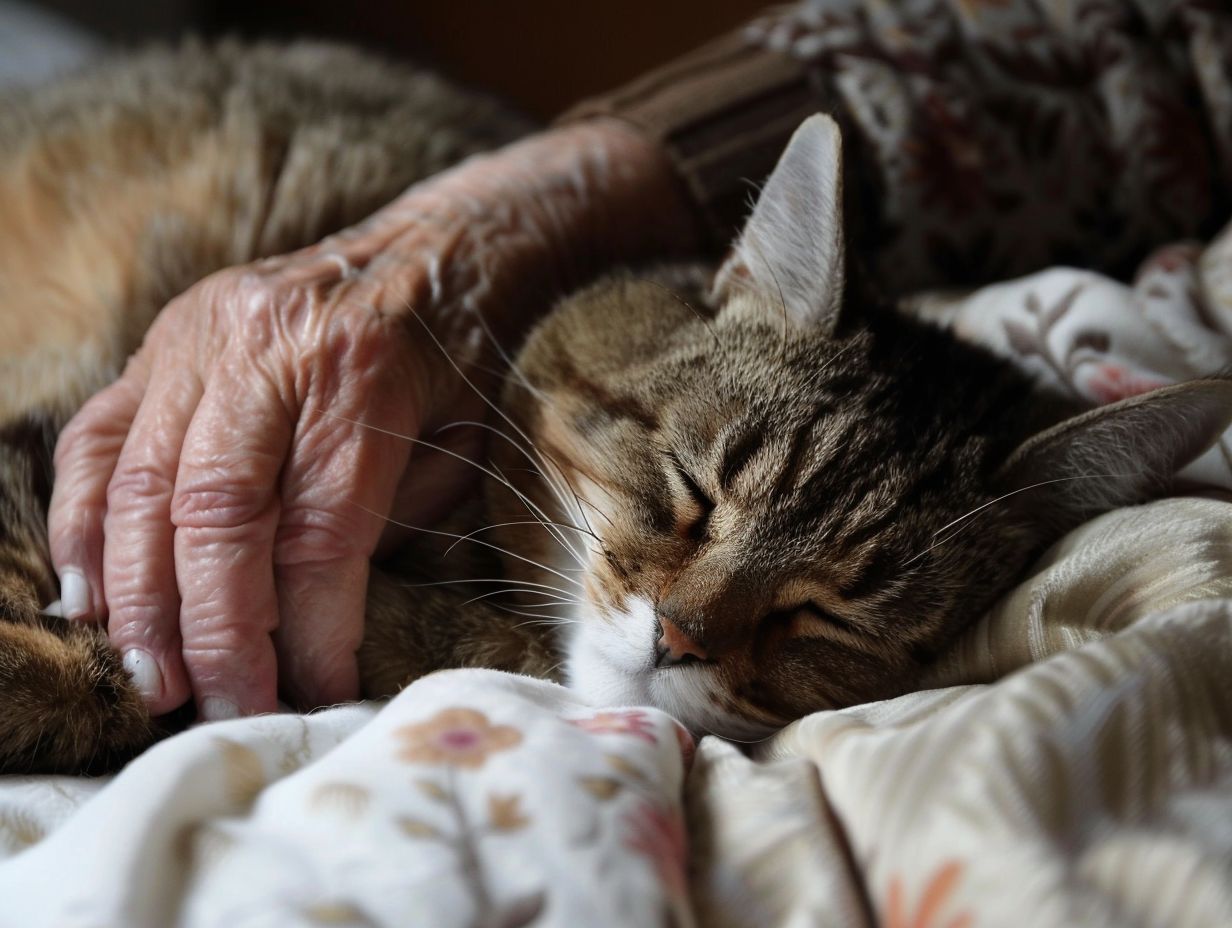
Pet insurance policies for senior cats include preventive care coverage to protect against potential accidents, heart disease, arthritis, and other ailments. These policies offer affordable proactive veterinary services and wellness services to help prevent issues and maintain good health. They often feature comparison tools to assist pet owners in selecting the most suitable claims process for senior cat insurance options.
The incorporation of preventive care in insurance policies for senior cats is significant as it aids in averting problems and promoting overall health. This is achieved through coverage for routine check-ups, vaccinations, dental care, and screenings that contribute to the well-being of the cat. Preventive care plays a crucial role in early detection and management of heart disease and arthritis. Comparison tools enable pet owners to evaluate different insurance policies based on the preventive care benefits provided, enabling informed decisions for their pets.
Pre-existing Condition Coverage
Ensuring coverage for pre-existing conditions such as kidney failure, renal disease, and other chronic health issues is a crucial component of pet insurance policies tailored for senior cats. It is essential to grasp how premiums may be impacted, potential exclusions, and the extent of coverage for pre-existing conditions for thorough healthcare planning.
Many senior cats are prone to developing kidney failure and renal disease, necessitating continuous medical care, specialized diets, and tailored attention. Insurance plans that encompass pre-existing conditions play a key role in alleviating the financial strain associated with managing these ailments. Therefore, understanding the policy’s exclusions, particularly which pre-existing conditions are not included, is vital.
Clearly defined criteria for identifying pre-existing conditions and the level of coverage for such conditions are significant factors to weigh when selecting a pet insurance plan for your aging feline companion.
Reimbursement Options
Reimbursement options in pet insurance policies for senior cats determine the level of cost coverage, maximum benefit limits, and reimbursement procedures for chronic conditions, cancer treatments, and other medical expenses. These reimbursement options are crucial for managing veterinary costs and providing financial assistance for your pet’s medical requirements. They enable senior cats to receive comprehensive care without the strain of high expenses.
Understanding the coverage rates aids pet owners in making informed decisions about their cat’s healthcare. Appropriate reimbursement options benefit senior cats with chronic conditions like cancer by easing the financial load of ongoing treatments and veterinary appointments. These options allow pet parents to prioritize their cat’s well-being without fretting over the financial aspects of essential medical interventions.
How to Compare and Choose the Right Policy
When selecting appropriate cat insurance for senior cats, the process involves researching insurance providers, evaluating coverage for accidents and wellness services, and selecting a policy that aligns with the healthcare needs of your senior cat. Consulting with a veterinarian can offer valuable insights to aid in decision-making.
It is crucial to consider the premium, deductible, and coverage limits when comparing insurance providers. Seek policies that provide comprehensive coverage for age-related conditions and routine check-ups. Conduct a thorough review of policy terms, including waiting periods and exclusions, to ensure it suits your cat’s needs. Assess customer reviews and ratings to gauge the satisfaction of current policyholders. Learn how to advocate for your senior cat during an insurance claim for more insights.
By taking into account these factors and seeking expert advice, you can effectively safeguard the health of your senior feline.
Researching and Comparing Policies
When choosing the best insurance for older cats, factors to consider include coverage for pre-existing conditions, age limits, chronic condition coverage, and common diseases in older cats. Understanding the policy details and any restrictions is essential to selecting the most suitable insurance plan for your senior cat.
Reputable insurance providers offering coverage for older cats will include conditions that may arise with age. It is important to verify coverage for pre-existing conditions and any age-related restrictions. Comparing different policy features will help you choose a plan that addresses your aging cat’s specific health requirements, ensuring they receive necessary care. Having the right insurance can offer peace of mind and financial assistance for medical care when your older cat needs it.
Consulting with Your Veterinarian
Seeking advice from a veterinarian is crucial when selecting a cat insurance plan, especially concerning specific health conditions such as cancer, dental disease, heart disease, and renal disease in older cats.
Your veterinarian will offer essential guidance on the most suitable insurance coverage for your cat’s requirements. Veterinarians can assess the unique needs of your senior cat and recommend insurance plans with dental coverage that cover necessary treatments and procedures. They can also anticipate common medical issues in older cats and help ensure that all required treatments are included in the coverage.
By consulting with your vet, you not only safeguard your cat’s health but also make informed decisions based on your cat’s individual healthcare needs.
Frequently Asked Questions
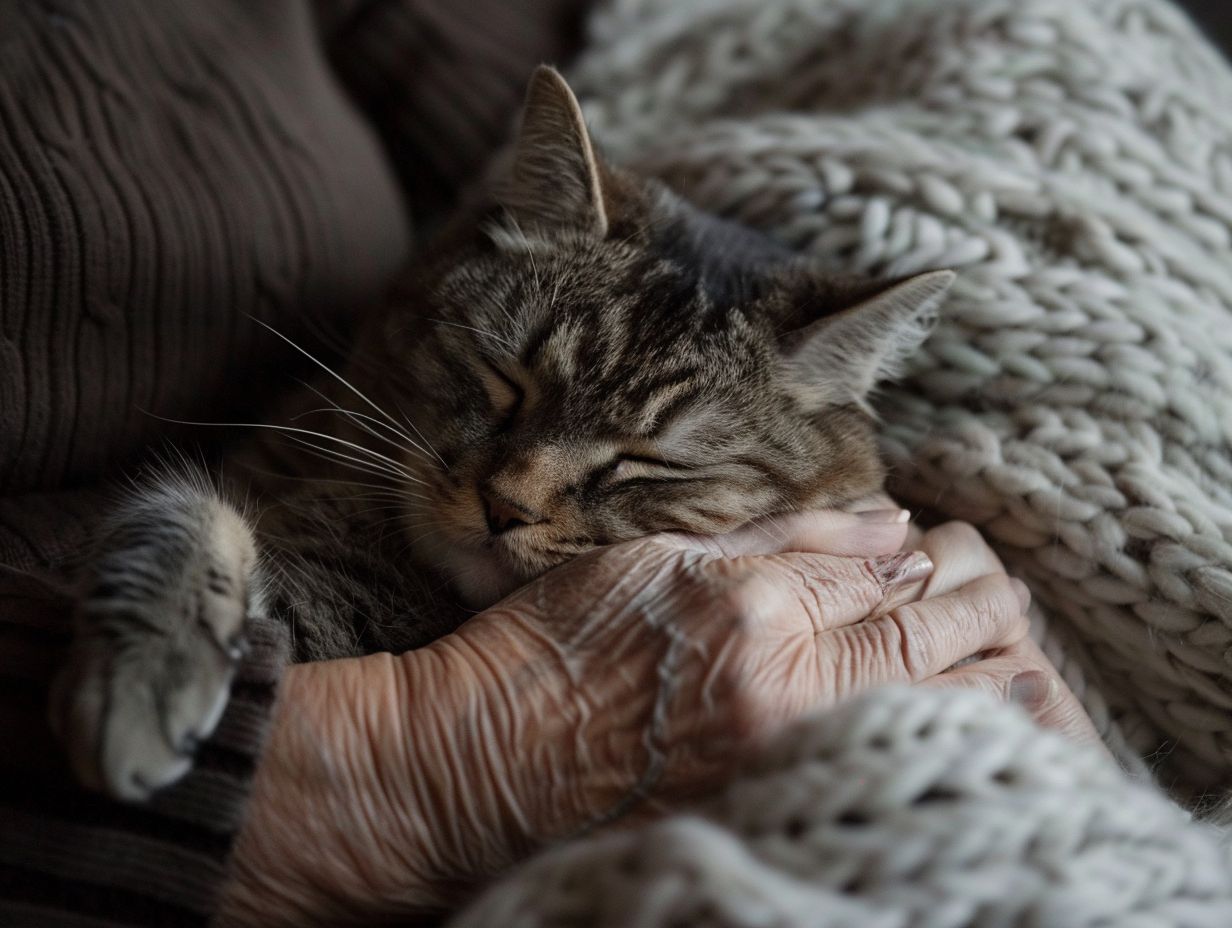
What is a senior cat insurance policy and why do I need it?
A senior cat insurance policy is a type of pet insurance that provides coverage specifically for cats in their senior years (usually ages 7 and up). As cats age, they become more susceptible to health issues and may require more frequent vet visits and treatments. This insurance can help alleviate the financial burden of unexpected medical expenses for older cats.
What should I look for when choosing a senior cat insurance policy?
When choosing a senior cat insurance policy, it’s important to consider the coverage options, deductibles, and premiums. Look for a policy that offers comprehensive coverage for common senior cat health issues, has a reasonable deductible, and fits within your budget.
What kind of coverage should I expect from a senior cat insurance policy?
A good senior cat insurance policy should cover a range of medical issues, such as chronic illnesses, cancer treatments, and emergency care. Some policies may also cover routine check-ups and vaccinations. Be sure to read the policy details carefully to understand what is covered.
How much does a senior cat insurance policy typically cost?
The cost of a senior cat insurance policy can vary depending on factors such as your cat’s age, breed, and overall health. On average, a senior cat insurance policy can cost anywhere from $20 to $50 per month. It’s important to compare different policies and choose one that offers the best coverage for your budget.
Are there any exclusions or limitations I should be aware of?
Many senior cat insurance policies have exclusions and limitations, so it’s important to read the fine print. Some policies may not cover pre-existing conditions, hereditary conditions, or certain breeds. It’s also important to note that most policies have a waiting period before coverage begins.
What if my cat already has a pre-existing condition?
If your cat already has a pre-existing condition, it may be difficult to find a senior cat insurance policy that covers it. However, some policies may offer coverage for pre-existing conditions if your cat has been symptom-free for a certain period of time. Be sure to discuss this with your insurance provider before purchasing a policy.

